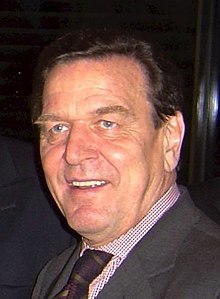TV debate between German chancellor Schröder and opposition leader Merkel held
Sunday, September 4, 2005
- Schröder loses motion of confidence
- German president dissolves parliament; elections in September
- German Constitutional Court green-lights early elections call
- TV debate between German chancellor Schröder and opposition leader Merkel held
- Death of candidate will delay final results for German federal election by weeks
- One week before German federal election, the race is wide-open again

German chancellor Gerhard Schröder (SPD) and the Chair of the Christian Democrats (CDU), Angela Merkel, faced each other on Sunday evening in the first and only debate between them in this election campaign.
The 90-minute long program, simulcasted on Germany's four major TV stations, focused on employment, taxation and social reforms.
Merkel stated that she wants to reduce the taxation on gasoline to ease the high price Germans have to pay at the pump. Schröder responded that the VAT-increase that the CDU is planning would neutralize that effect and that his government hadn't increased gasoline taxes since 2003.
The chancellor went on to blast Merkel's designate Finance minister Paul Kirchhof, a proponent of a flat tax on income. He said that Kirchhof's suggestions would turn Germans into "guinea pigs". But Merkel called Kirchhof a "visionary" and said her party would make taxation "easier and more just".
Speaking of employment, Schröder stated that his reforms are beginning to work and that he is on the right track. Merkel referred to five million unemployed Germans and said that seven years of Schröder government were "bad years for Germany".
Polls conducted by the ARD after the debate show that 49% of Germans believe that Schröder was "more convincing" while 33% think that Merkel was. The ZDF said that 48% of the population think Schröder performed better, while 28% say the same about Merkel.

However, overall polls conducted by the ARD as well, say that Schröder's SPD can expect 32% in the upcoming federal election, his current coalition partner, the Greens, 7%. Merkel's CDU, along with its bavarian sister party CSU, on the other hand is projected to get 43%, which would enable them to form a coalition government with the FDP, which stands at 6%. Their majority however is slim, because the newly formed Party of the Left can expect 9%.
Sources
edit- "Steuern und Arbeitsmarkt bei TV-Duell im Vordergrund" — AFP, September 4, 2005
- "Klarer Punktsieg - nur für wen?" — ZDF, September 4, 2005
- "Scharfe Töne im TV-Duell" — ARD, September 4, 2005